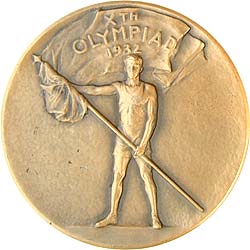
Summer Games: Previous | Next
Return to main page / index of medals.
Return to Eric Holcomb Company home page.

1932 SUMMER OLYMPIAD
Los Angeles, California, U.S.A.
DESCRIPTION
The obverse depicts an athlete holding an unfurled flag / banner of the Xth Olympiad. The reverse has two seated female figures supporting a shield of the United States. One carries an olive branch and the other a shield of the State of California and city of LA. The medal was presented in a light-brown paper box lined with tanned velvet.
THE GAMES
Because the 1932 Olympics were held in the middle of the Great Depression and in the comparatively remote city of Los Angeles, half as many athletes took part as had in 1928. Nevertheless, the level of competition was extremely high and 18 world records were either broken or equaled. The crowds set records too, starting with the 10,000 people who attended the Opening Ceremony. The 1932 Olympics were the first to last 16 days. The duration of the Olympics has remained between 15 and 18 days ever since. Between 1900 and 1928, no Summer Olympics was shorter than 79 days. For the first time, the male athletes were housed in a single Olympic Village. The women stayed in a luxury hotel. At the victory ceremonies, the medal winners stood on a victory stand and the flag of the winner was raised. Official automatic timing was introduced for the track events, as was the photo-finish camera. 14-year-old Kusuo Kitamura of Japan won the 1500m freestyle to become the youngest male in any sport ever to earn a gold medal in an individual event. 18-year-old American Babe Didrikson qualified for all five women's track and field events but was only allowed to compete in three. She won the javelin throw and set world records in the high jump and the 80m hurdles. Ivar Johansson, a Swedish policeman, won gold medals in both freestyle and Greco-Roman wrestling. Another Swedish wrestler, Carl Westergren, won his third Greco-Roman title, each in a different division. In the spirit of fair play, British fencer Judy Guinness gave up her hopes for a gold medal when she pointed out to officials that they had not noticed two touches scored against her by her final opponent, Ellen Preis of Austria.
Additional Photos